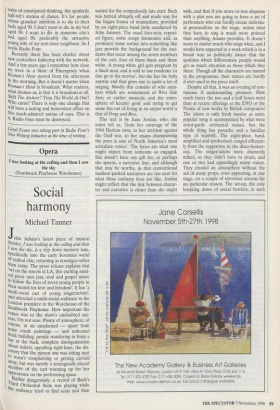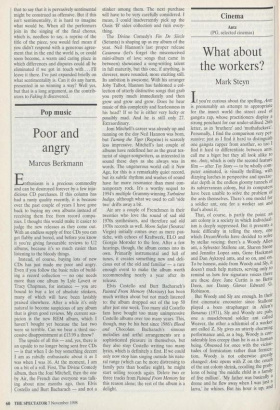I was looking at the ceiling and then I saw
the sky
(Southwark Playhouse Warehouse)
Social harmony
Michael Tanner
John Adams's latest piece of musical theatre, I was looking at the ceiling and then I saw the sky, is a trip down memory lane, specifically into the early Seventies world of radical chic, returning as nostalgia rather 'than camp. The press release explains that set on the streets in LA, this exciting musi- cal piece uses jazz, soul and gospel music to follow the lives of seven young people in their search for love and freedom'. It has 'a multi-racial cast of young singer/actors'. and attracted a multi-racial audience to the London premiere in the Warehouse of the Southwark Playhouse. How important the venue was to the show's undoubted suc- cess, I'm not sure. Plenty of atmosphere, of in an unadorned — apart from some crude paintings — and unheated brick building, people wandering in from a bar at the back, complete disorganisation about tickets, appalling sight-lines, the dis- covery that the person one was sitting next to wasn't complaining or getting carried away, but was merely a strategically placed member of the cast warming up for her appearance on the performing space. Rather dangerously, a record of Bach's Third Orchestral Suite was playing while the audience tried to find seats and then waited for the compulsorily late start. Bach was turned abruptly off and made way for the lingua franca of minimalism, provided by an eight-piece band jivily conducted by John Janssen. The usual four-note repeat- ed figure, some soupy harmonies and, as promised, some sorties into something like jazz provide the background for the inci- dents that occur among the seven members of the cast, four of them black and three white. A young white girl gets pregnant by a black man, and is told to use condoms 'or else go to the movies', but she has the baby anyway and that gives rise to quite a lot of singing. Mostly this consists of solo num- bers which are reminiscent of West Side Story or earlier musicals, and the atmo- sphere of keepin' goin' and trying to get some fun out of living in an unjust world is that of Porgy and Bess.
The text is by June Jordan, who, the notes tell us, 'from her coverage of the 1964 Harlem riots, to her activism against the Gulf war, to her essays championing the poor is one of North America's most articulate voices'. The lyrics are what one might expect from someone so engaged. She doesn't have any gift for, or perhaps she spurns, a narrative line; and although that may be worthy, in that conventional incident-packed narratives are too neat for what these ordinary lives are like, Jordan might reflect that the link between charac- ter and narrative is closer than she might wish, and that if you more or less dispense with a plot you are going to have a set of performers who can hardly create individu- al personalities on the stage, unless what they have to sing is much more pointed than anything Adams provides. It doesn't seem to matter much who sings what, and I would have expected in a work which is in a broad way so politically aware that the qualities which differentiate people would get as much attention as those which they share. Though all the characters are named in the programme, their names are hardly if ever used in the piece itself.
Despite all that, it was an evening of con- tinuous if undemanding pleasure. How much faster the two and a half hours went than at recent offerings at the ENO or the Proms of new works by British composers! The idiom is only fresh insofar as semi- popular song is accompanied by what were avant-garde orchestral noises, but the whole thing has panache and a familiar type of warmth. The eight-piece band, amplified and synthesised, ranged efficient- ly from the supportive to the disco-boister- ous. The singer/actors were discreetly miked, so they didn't have to strain, and one or two had appealingly warm voices. They created an atmosphere without the aid of many props, even appearing, at one stage, on a couple of television screens for no particular reason. The set-up, the easy breaking down of social barriers, is such that to say that it is pervasively sentimental might be construed as offensive. But if this isn't sentimentality, it is hard to imagine what would be. When all the performers join in the singing of the final chorus, which is, needless to say, a reprise of the title of the piece, you would feel mean if you didn't respond with a generous agree- ment that in the end the world is, or could soon become, a warm and caring place in which differences and disputes could all be eliminated if we got in touch with ... I'll leave it there. I've just expanded briefly on what sentimentality is. Can it do any harm, presented in so winning a way? Well yes, but that is a long argument, as the contrib- utors to Faking It discovered.



















































































 Previous page
Previous page